AI Legal Transcription: Fast, Secure & Scalable for Law Firms
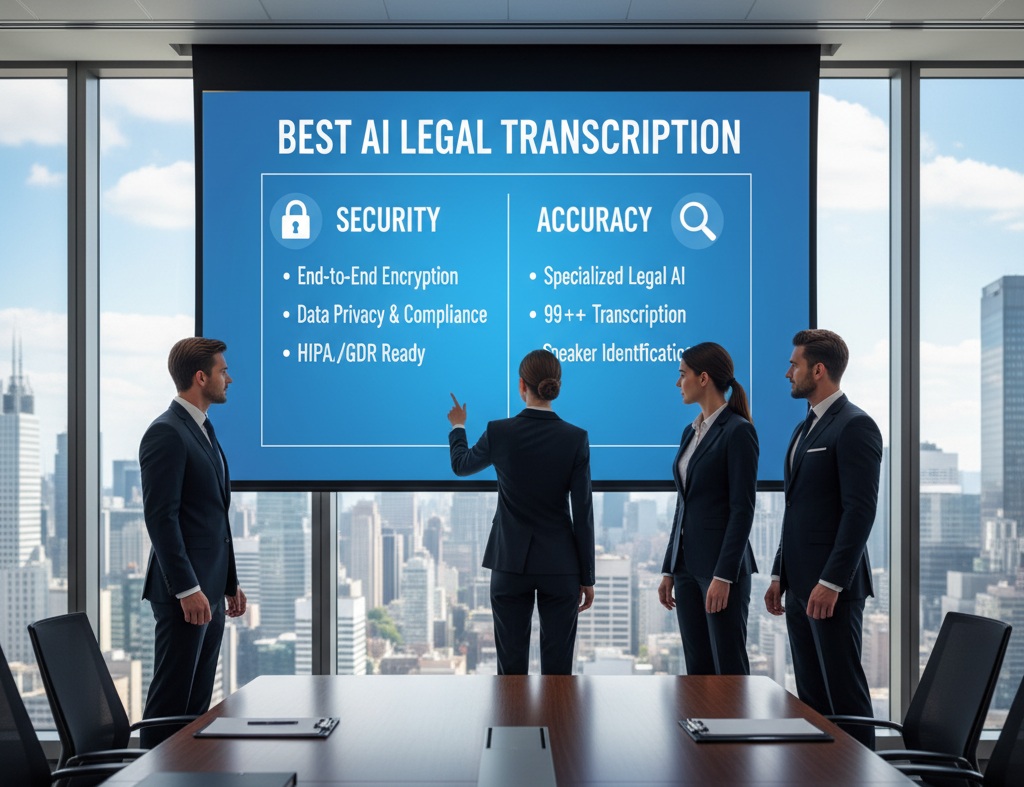
Introduction
Legal transcription has long been a cornerstone of litigation, compliance, and case documentation. Whether it's converting courtroom recordings, deposition audio, or client interviews into searchable text, the process has traditionally been slow, expensive, and prone to human error. Manual transcription services often require hours—or even days—to deliver usable transcripts, and the cost per minute can quickly add up for firms handling high volumes of legal audio.
Enter AI legal transcription: a transformative solution that combines speed, affordability, and precision. Powered by machine learning and natural language processing, these tools can transcribe legal recordings in real-time, identify speakers, and even recognize complex legal terminology like voir dire, amicus curiae, or sub judice. The result? Law firms, paralegals, and corporate legal departments can now streamline their workflows, reduce overhead, and accelerate case preparation without compromising on quality.
But speed alone isn’t enough. Legal professionals operate in a high-stakes environment where accuracy, security, and compliance are non-negotiable. Transcripts must be airtight—not just for internal review, but for court admissibility, regulatory audits, and client confidentiality. That’s why the best AI legal transcription tools go beyond basic voice-to-text—they offer end-to-end encryption, GDPR and HIPAA compliance, and customizable legal dictionaries to ensure every word is captured correctly.
This guide explores how AI legal transcription is reshaping the legal industry. From reducing transcription costs to enhancing eDiscovery workflows, we’ll cover the top use cases, security standards, and buying criteria that matter most to legal professionals. Whether you're a solo attorney or part of a global litigation team, understanding the power of AI transcription can give your firm a competitive edge.
---
Why AI Legal Transcription Is a Game-Changer
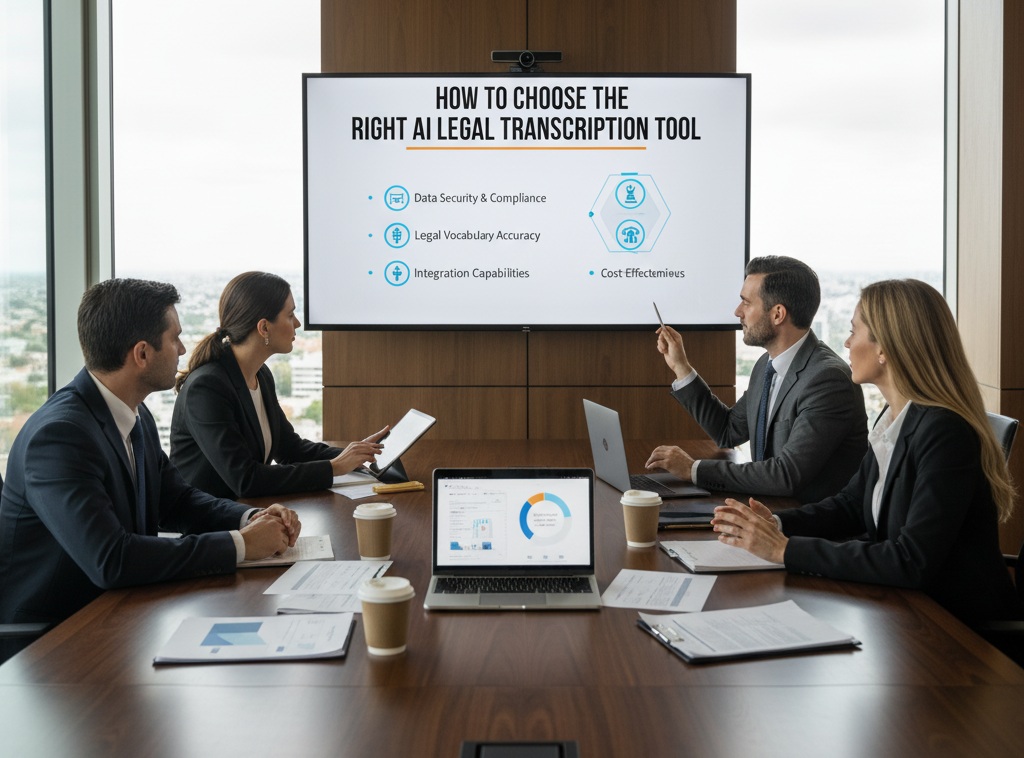
For decades, legal transcription has been a bottleneck in litigation and case management. Traditional transcription services—whether in-house or outsourced—are slow, costly, and constrained by human availability. A single deposition or multi-party interview can take hours to transcribe manually, and the turnaround time often stretches into days. For firms handling high volumes of audio, this delay can stall case preparation, increase overhead, and frustrate clients.
AI legal transcription changes the equation entirely. By leveraging advanced speech recognition and legal-specific language models, these tools deliver transcripts in real-time, often within seconds of audio capture. This means attorneys and paralegals can begin reviewing testimony, client statements, or courtroom exchanges immediately—without waiting for manual drafts.
The cost savings are equally compelling. While human transcription typically costs between $1.50 and $5.00 per minute, AI solutions average just $0.10 to $0.50 per minute. For firms transcribing hundreds of hours of audio each month, this translates to thousands in savings—without sacrificing quality.
Scalability is another critical advantage. AI transcription platforms can process massive volumes of audio simultaneously, making them ideal for large-scale eDiscovery projects, class-action litigation, or regulatory audits. Whether you're handling 10 hours or 1,000 hours of legal recordings, AI tools scale effortlessly to meet demand.
And then there's searchability—a feature manual transcripts simply can't match. AI-generated transcripts are fully searchable, allowing legal teams to spot keywords, phrases, or speaker references instantly. This accelerates document review, improves collaboration, and enhances the overall efficiency of legal workflows.
In short, AI legal transcription isn't just a convenience—it's a strategic upgrade. It empowers law firms to move faster, spend less, and operate with greater precision. For modern legal teams, adopting AI transcription is no longer optional—it's essential.
---
Use Cases That Matter
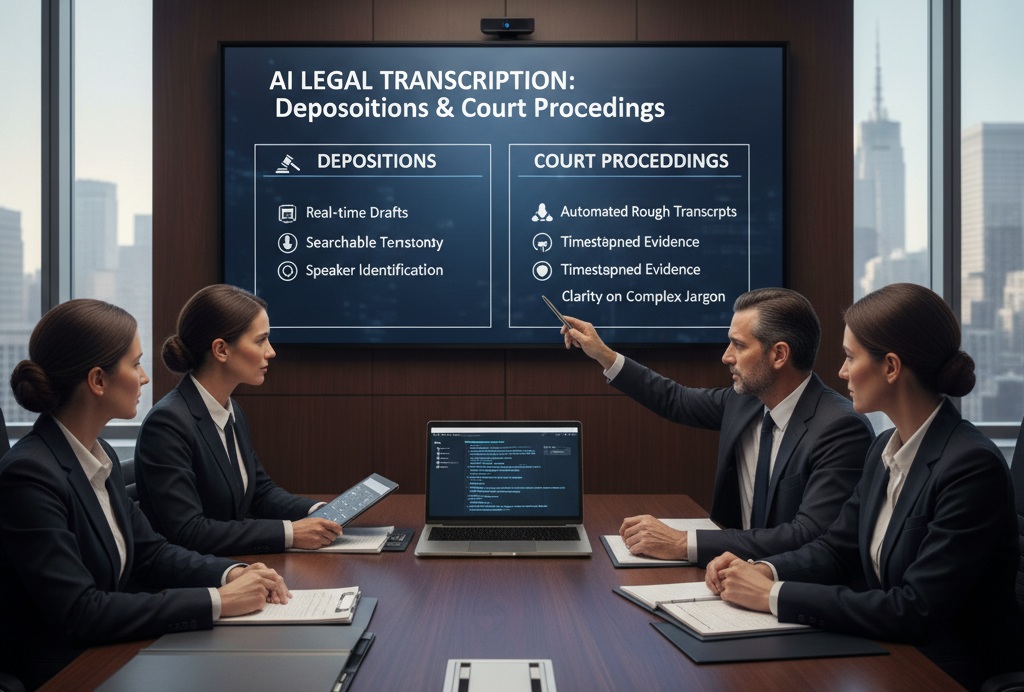
AI legal transcription isn’t just a convenience—it’s a versatile tool that adapts to the diverse needs of modern law firms. From litigation prep to compliance audits, its applications span every corner of legal practice. Below are the most impactful use cases where AI transcription delivers measurable value.
Depositions & Court Proceedings
Depositions are often the most critical phase of litigation. With AI transcription, legal teams can generate rough drafts of deposition transcripts immediately after the session—sometimes even in real-time. This allows attorneys and paralegals to begin reviewing testimony before certified records are finalized.
- Accelerates case preparation: Early access to transcripts enables faster strategy development and evidence review.
- Reduces reliance on human court reporters: While certified transcripts are still required for official records, AI-generated drafts provide a head start.
- Improves collaboration: Teams can annotate, share, and search transcripts across departments or co-counsel.
Example: A litigation firm handling multi-party depositions used AI transcription to deliver same-day drafts, cutting prep time by 40% and reducing paralegal workload.
eDiscovery & Video Evidence
In complex cases, eDiscovery often includes hours of surveillance footage, recorded calls, or video interviews. Manually reviewing this media is time-consuming and error-prone. AI transcription converts audio and video into searchable text, making it usable in litigation and regulatory investigations.
- Supports large-scale eDiscovery: Transcribe hundreds of hours of media quickly and accurately.
- Enables keyword-based evidence review: Spot critical phrases, names, or timestamps instantly.
- Improves documentation for compliance: Maintain clear records for audits, discovery disclosures, and internal investigations.
Example: A corporate legal team transcribed 300+ hours of internal call recordings during a fraud investigation, saving over ₹12 lakh in transcription costs and accelerating their review timeline by two weeks.
Client Consultations & Witness Interviews
Attorneys frequently record client calls, witness statements, or intake interviews. These conversations often contain sensitive information, emotional nuance, and complex legal terminology. AI transcription tools preserve all of it—securely and accurately.
- Ensures confidentiality: End-to-end encryption protects attorney-client privilege.
- Captures emotional tone and context: Speaker diarization and legal vocabulary models retain nuance.
- Saves time on manual note-taking: Attorneys can focus on listening, not typing.
Example: A solo practitioner used AI transcription to convert voice memos into formatted case notes, reducing documentation time by 60% and improving client follow-up.
---
Security & Accuracy: What Law Firms Demand
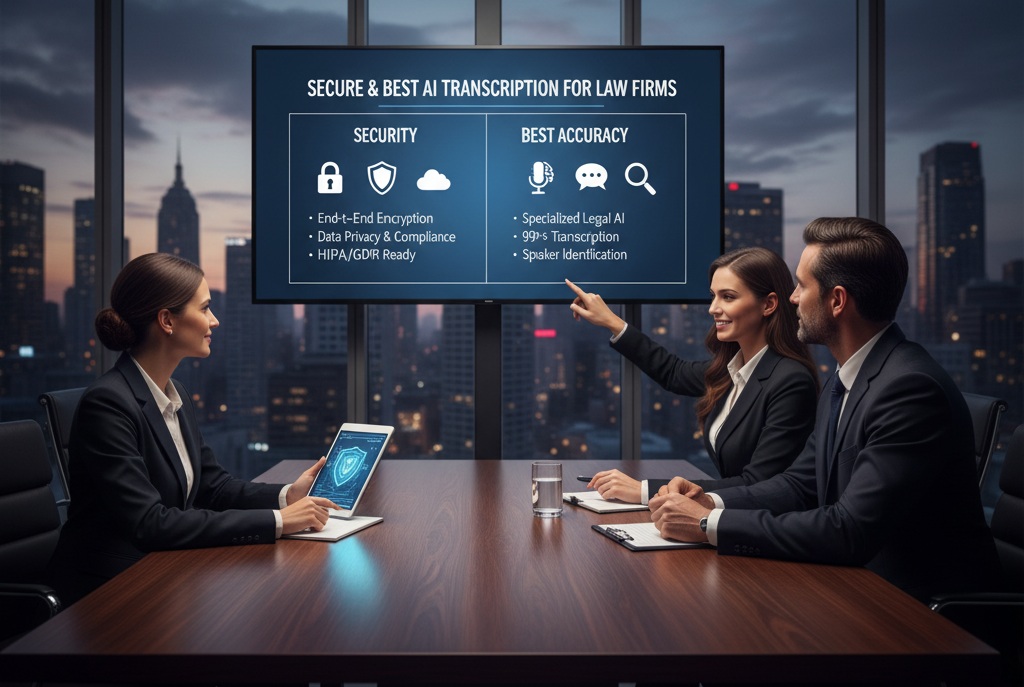
In legal transcription, speed and cost savings are valuable—but they mean nothing without airtight security and precision. Law firms handle sensitive client data, confidential case details, and privileged communications. Any breach or misinterpretation can have serious legal consequences. That’s why security and accuracy are the two pillars of trustworthy AI legal transcription.
Data Security & Attorney-Client Privilege
Legal professionals operate under strict confidentiality rules. Transcription tools must uphold the same standards as the firm itself. The best AI transcription platforms are built with enterprise-grade security protocols that protect data at every stage.
- End-to-End Encryption (E2E): Ensures that audio files and transcripts are encrypted both in transit and at rest.
- Regulatory Compliance: Look for tools that meet GDPR, CCPA, and HIPAA standards—especially if you're handling medical-legal cases or cross-border litigation.
- Zero Data Retention for AI Training: Your recordings should never be used to train public models. Top providers offer explicit guarantees that your data remains private and isolated.
These features aren’t just technical—they’re legal safeguards. They help preserve attorney-client privilege, protect against discovery violations, and ensure compliance with data protection laws across jurisdictions.
Example: A compliance-focused law firm in Delhi chose an AI transcription provider with ISO 27001 certification and HIPAA compliance, ensuring their client interviews and medical-legal depositions remained fully protected under Indian and international privacy laws.
Legal-Specific Accuracy
Legal language is complex, nuanced, and often domain-specific. Generic transcription tools—built for casual conversation or business meetings—struggle with terminology like amicus curiae, voir dire, or res judicata. Misinterpreting these terms can lead to flawed transcripts and costly errors.
Top-tier AI legal transcription platforms solve this with:
- Custom Legal Vocabulary Models: These are trained on statutes, case law, and legal dictionaries to improve recognition of technical terms and Latin phrases.
- Speaker Diarization: Automatically identifies and separates speakers, which is crucial for multi-party depositions, hearings, and interviews.
- In-Browser Editing Tools: Paralegals and attorneys can review, annotate, and correct transcripts directly within the platform—ensuring 100% accuracy before submission or filing.
Accuracy isn’t optional—it’s mission-critical. A single misheard phrase can change the meaning of testimony, affect case outcomes, or compromise legal strategy. That’s why firms should prioritize AI tools built specifically for legal use—not general-purpose transcription engines.
Example: A litigation team handling multilingual depositions used an AI tool with built-in legal glossaries and speaker tagging, reducing post-editing time by 70% and improving transcript reliability in court filings.
---
Comparison Table: AI vs Human vs Generic Tools
| Feature | AI Legal Transcription | Generic AI Tool | Human Transcription |
|---|---|---|---|
| Legal Jargon Accuracy | ✅ Optimized for legal terms | ❌ Often inaccurate | ✅ High accuracy |
| Security Compliance | ✅ GDPR, HIPAA, CCPA | ❌ Limited | ✅ Often compliant |
| Turnaround Time | ✅ Seconds to minutes | ✅ Fast | ❌ Hours to days |
| Cost per Minute | ✅ $0.8 | ✅ $0.10–$0.50 | ❌ $1.50–$5.00 |
| Editing Tools | ✅ Built-in editor | ❌ Limited | ✅ Manual review |
---
How to Choose the Right AI Legal Transcription Tool

With dozens of AI transcription platforms on the market, choosing the right one for legal use requires more than a quick feature scan. Legal professionals must evaluate tools based on accuracy, security, formatting, integration, and cost-efficiency—all while ensuring the solution aligns with the firm’s workflow and compliance requirements.
Here’s a breakdown of what to look for before committing:
- Accuracy:
- Security:
- Formatting:
- Integration:
- Pricing:
Pro Tip: Ask vendors for sample transcripts from real legal cases. Reviewing actual output helps you assess formatting quality, speaker tagging, and terminology accuracy before making a decision.
Example: A midsize litigation firm in Chicago tested three AI transcription platforms using a noisy, multi-party deposition recording. The winning tool delivered a 95% accurate draft in under 10 minutes, integrated with their case management system, and cost just $0.20 per minute—making it the clear choice for long-term adoption.
---
Frequently Asked Questions
 AI legal transcription is still a new frontier for many law firms, so it’s natural to have questions. Below are the most common concerns legal professionals raise when evaluating transcription tools—and clear answers to help guide your decision.
AI legal transcription is still a new frontier for many law firms, so it’s natural to have questions. Below are the most common concerns legal professionals raise when evaluating transcription tools—and clear answers to help guide your decision.Is AI legal transcription admissible in court?
AI-generated transcripts are typically used for internal review, strategy development, and early case preparation. For official court filings or certified records, human transcription—often by a licensed court reporter—is still required. However, AI drafts can dramatically reduce the time and cost involved in producing final transcripts.
- Use AI for speed and review
- Use certified human transcripts for submission
- Hybrid workflows are increasingly common in litigation teams
Can AI handle legal jargon?
Yes—top-tier AI transcription platforms are trained on legal dictionaries, statutes, and case law. They recognize complex terminology such as voir dire, res judicata, amicus curiae, and more. Some tools even allow firms to upload custom glossaries to improve accuracy for niche practice areas like intellectual property or medical malpractice.
- Legal-specific language models improve recognition
- Custom vocabulary support enhances precision
- Speaker tagging helps clarify multi-party exchanges
Is it safe to transcribe client calls?
Absolutely—provided you choose a provider that prioritizes data security. Look for platforms that offer:
- End-to-End Encryption (E2E)
- Zero data retention for AI training
- Compliance with GDPR, HIPAA, and CCPA
These safeguards ensure that sensitive conversations remain confidential and protected under attorney-client privilege.
Pro Tip: Always review the provider’s privacy policy and terms of service before uploading any client audio.
What’s the best tool for solo attorneys?
Solo practitioners need tools that are affordable, easy to use, and secure. The best AI transcription platforms for solo attorneys typically offer:
- Low cost-per-minute pricing
- Built-in editing tools
- Secure cloud storage
- No minimum usage requirements
Some platforms also include mobile apps, allowing attorneys to record and transcribe client calls or field interviews on the go.
Example: A solo attorney in Pune used an AI transcription app to convert voice memos into formatted case notes, saving hours each week and improving client follow-up.
---
Case Study: How One New York Firm Saved $18K

A mid-sized litigation firm based in New York City faced mounting transcription costs and delays while handling depositions, client interviews, and internal investigations. With over 500 hours of legal audio recorded monthly, their reliance on manual transcription was slowing down case prep and inflating overhead.
In early 2025, the firm adopted an AI legal transcription platform tailored for litigation workflows. Within six months, they achieved dramatic results:
- Transcribed 500+ hours of audio across depositions, witness interviews, and compliance calls
- Reduced turnaround time by 80%, enabling same-day access to rough drafts
- Saved over $18,000 in transcription fees compared to their previous vendor
- Improved case prep speed by 35%, allowing attorneys to begin strategy development immediately after recording
The firm also integrated the AI tool with their existing case management system, enabling paralegals to edit transcripts in-browser and export them in court-ready formats. Speaker diarization and legal vocabulary models ensured high accuracy—even in multi-party recordings with complex terminology.
AI transcription is now a standard part of their workflow, used daily by litigation teams, compliance officers, and client intake specialists. The firm reports higher productivity, faster turnaround, and improved collaboration across departments.
---
Conclusion: Your Competitive Edge Starts Here
In today’s fast-paced legal landscape, efficiency isn’t a luxury—it’s a necessity. From litigation prep to compliance documentation, every minute counts. That’s why forward-thinking law firms are turning to AI legal transcription not just as a tech upgrade, but as a strategic investment.
By adopting secure, accurate, and scalable transcription tools, your legal team can:
- Eliminate costly delays in case preparation
- Reduce transcription expenses by up to 90%
- Improve collaboration across departments
- Ensure compliance with data protection laws
- Focus on legal strategy—not manual formatting
Whether you're handling depositions, client interviews, or eDiscovery media, AI transcription empowers your firm to move faster, work smarter, and deliver better outcomes for your clients.
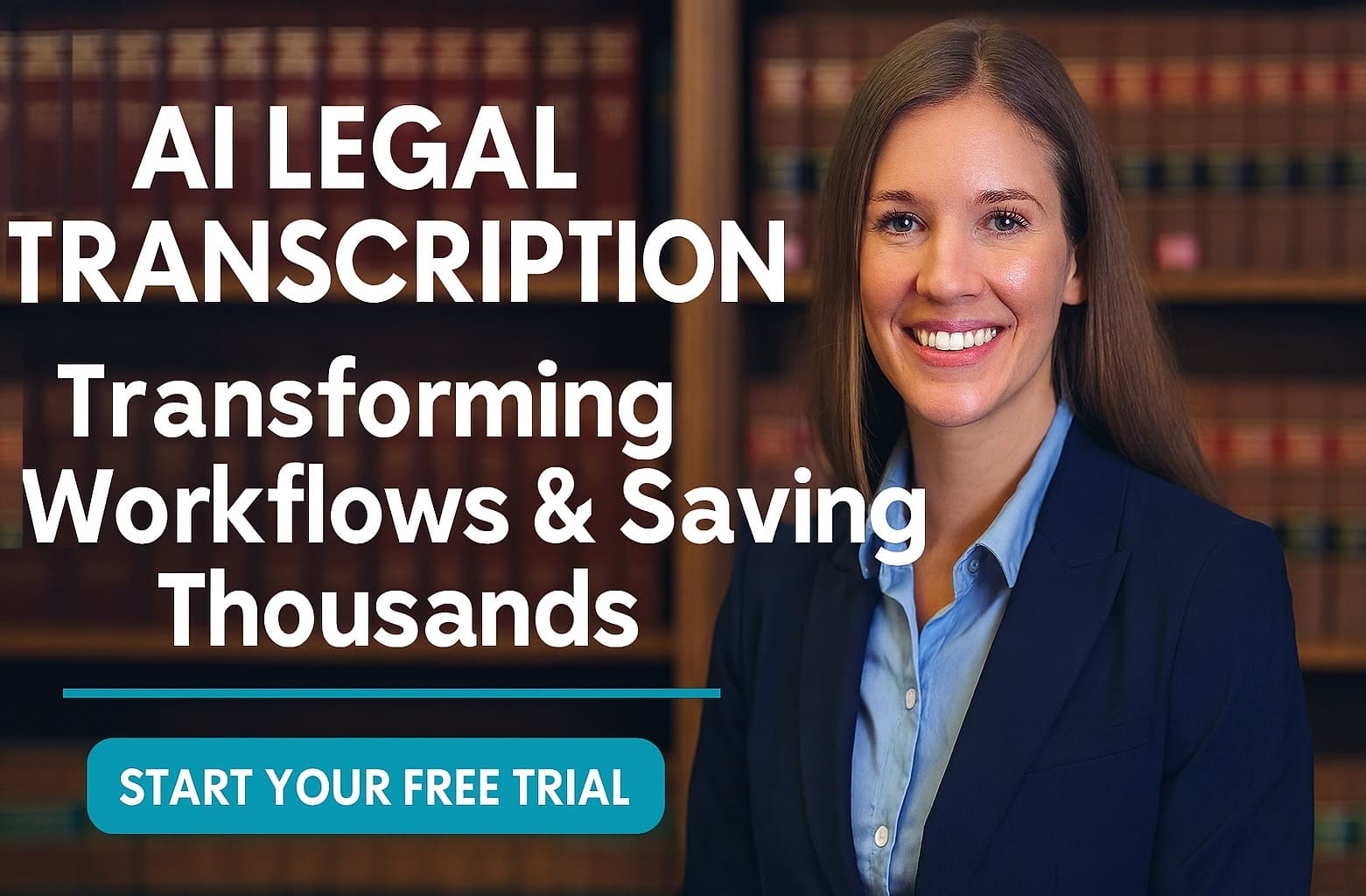 Ready to transform your workflow with AI legal transcription? Start Your Free Trial Today
Ready to transform your workflow with AI legal transcription? Start Your Free Trial Today